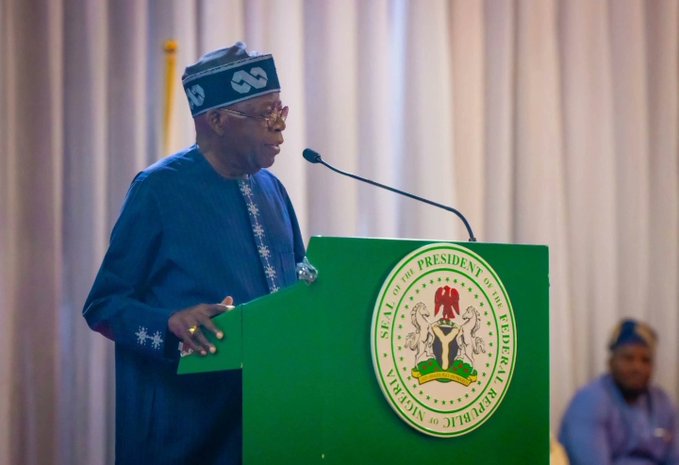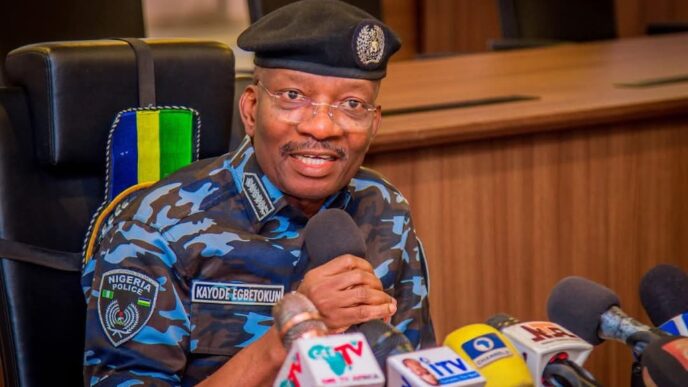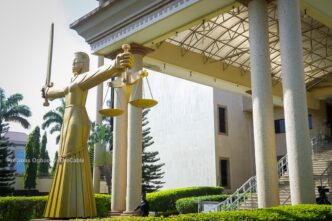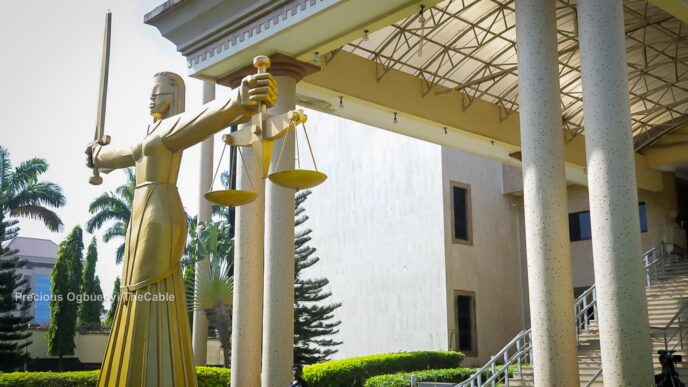President Bola Tinubu
BY ANTHONY C. NWORAH
His Excellency, Mr. Bola Ahmed Tinubu,
The President of the Federal Republic of Nigeria and Commander in Chief of the Armed Forces, Aso Rock Villa,
Three Arms Zone, Abuja
Your Excellency,
I have observed with interest media reports of ongoing discussions between the presidency and the governors regarding the establishment of state police to tackle the menace caused by the hydra-headed monster of insecurity.
Advertisement
This is very laudable as it has been evident for decades that the Nigerian Police Force (NPF) cannot effectively police the country. Your Excellency, I believe during your pre-presidency years, you have also been an advocate of the establishment of state police. The opportunity has now come for you to write your name in gold.
The establishment of a state police force is such a profound change in security policy and architecture that we have had for over sixty years and hence a paradigm shift is needed to make it work. I have therefore outlined a few recommendations below that the presidency and the governors may consider in establishing a state police force.
However, before delving into that, the point has to be made that the strongest criticism against the misuse of the state police by governors. This is a very justifiable and legitimate concern. We have heard so many stories of governors using the NPF to harass and intimidate their political opponents. Imagine what they can do when they have a state police under their control.
Advertisement
Hence, to ensure that the state police does not become a tool for the governors to use as their political stormtroopers, the control of the governor over the state police has to be examined and curtailed.
Below are my recommendations.
ESTABLISHMENT OF THE STATE POLICE FORCE
It should not be mandatory for a state to have its police force. Each state should have the option of wanting to establish its force.
Advertisement
This is because some states may not have the resources to set up a professional police force of international standards. The State Police Force must be a professional body extensively trained in investigation methods, profiling, use of weaponry, law enforcement, and most importantly respect for the rule of law and human rights.
A state must be made to apply for a fiat from the federal government before it is allowed to set up its police force. The application for fiat must be made by the governor and backed by resolutions carried out by its house of assembly.
Before the federal government issues the fiat, it must be sure that the State has met certain standards to be able to run a police force. Otherwise, the State can continue using the NPF.
RECRUITMENT & TRAINING
Advertisement
One of the standards is for the state to show it has set up a properly equipped and professionally managed training school for police recruits. The school should contain hostels, dining halls, classrooms, forensic laboratories, firing grounds, gyms, hospitals, places of worship, and recreational facilities. The school must always be clean, organised and properly maintained. The instructors/facilitators should be police veterans with at least 10 or 15 years experience and may be foreigners.
The recruits must have a minimum qualification of OND and be at least 18 years of age with national identification numbers. They should not be involved in any cult or anti-social activities. Training should take at least one year after which a qualification exam will be taken. Those who fail will be allowed to take the exam one more time before failing out forever.
Advertisement
The federal government can outline the law enforcement training courses for the states to adopt in their respective training schools. The major highlight of the theoretical training courses should be civic studies, where they will be drilled in respect for human rights and the rule of law.
POLICE COMMITTEE
Advertisement
The state must show that it has set up a police committee in place. The committee must be an odd number comprising at least five individuals. The committee will oversee the welfare and training of the police, appointment, disengagement and disciplinary actions of the commissioner of police, and handle petitions, appeals and opinions from the public regarding law enforcement issues.
For transparency and integrity, the committee should comprise the following individuals at least;
Advertisement
i. State chairman of the Nigerian Bar Association
ii. State chairman of the Nigerian Union of Journalists
iii. State chairman of the Christian Association of Nigeria
iv. State chairman of the Muslim community
v. State chairman of the labour union
The committee will elect a chairman from among themselves who will have the swing vote on every decision taken. The committee must keep records of their meeting and because this is a security issue, their minutes must be conveyed to the governor and speaker of the house of assembly bearing the signature of every member.
APPOINTMENT OF THE COMMISSIONER OF POLICE
The highest-ranking police officer shall automatically be in line for recommendation by the committee to the house of assembly to become the commissioner of police. When approved by the house of assembly, he becomes the COP and shall serve in the office for two terms of four years each or until the happening of any of the following occurrences before he serves his two terms;
i. Retirement
ii. Incapacity to discharge the functions of his office as a result of illness or disability. In this case, the committee will recommend his retirement with payment of full benefits.
iii. Conviction of a crime
iv. Dismissal on the recommendation of the committee on the occurrence of any of the following;
a. Petition signed by a certain percentage of registered voters of the state on established grounds of incompetence or abuse of office.
b. Motion successfully passed by the house of assembly on established and proven grounds of incompetence or abuse of office.
If the highest-ranking officer is not deemed qualified by the committee to occupy the office of COP as a result of poor record performance or after poor service of the first term, the committee will recommend the next highest-ranking officer for the office of COP.
POWERS OF THE GOVERNOR
While the COP must report directly to the governor and the committee on security matters, the governor will not have the power to dismiss the COP. However, the governor can recommend to the committee for dismissal or other punishment of the COP based on established and proven grounds of incompetence or abuse of office. The committee after investigating the governor’s petition may carry out or refuse to carry out the governor’s recommendation or impose some lesser disciplinary measures.
It will be the responsibility of the governor to allocate sufficient resources for the recruitment, training, operations and administration of the police.
GEOGRAPHICAL JURISDICTION
While each state police will determine its own security architecture, the jurisdiction of the police will be confined to the geographical boundaries of the state. If they need to perform their duty in another state such as apprehension of a suspect, they should enlist the approval and/or logistical support of the other state police to act in the other state. Or they can call on the Nigerian Police Force or any other federal law enforcement agency to assist in apprehending a criminal who has fled beyond the State Boundaries and extradite the suspect to the state where the crimes were committed. If compelling exigencies such as a high pursuit of a suspect crosses boundary lines, the pursuing police can cross the state lines to apprehend the suspect. But upon his arrest, the suspect must be handed over immediately to the police station of the host state for booking and for approval to release the suspect to the pursuing police.
CRIMINAL JURISDICTION
The fiat should outline their jurisdiction relating to criminal investigation and arrest. Their duties should cover every crime within their states except those that have to do with electoral offences such as rigging, thuggery, bribery, and harassment of those who have registered to run for office in their various political parties. In the United States, kidnapping is within the jurisdiction of the Federal Bureau of Investigation because of the propensity for kidnappers to transport their hostages to cross state boundaries even though local police may be involved under the supervision of the FBI. The same can be adopted here using the NPF.
Where the investigative or arrest activities of the state police are in direct conflict with those of a federal law enforcement agency, the agency will take over the investigation and maintain the superior or sole status of the investigation. Both police and agency can decide to work together in an investigation but the federal agency will be regarded as the lead investigator.
In addition, for a particular task that involves a federal or national crime, the federal law enforcement agency may federalise the local or state police unit temporarily for the duration of the task. During the period of federalisation, the local police officers so federalised will be regarded as members of the federal law enforcement agency and shall be under the orders and supervision of the federal agency. The federal agency should also be responsible for their welfare and payment during the period of federalisation.
STATE OF EMERGENCY
If a state of emergency is declared in a state, the state police and other local law enforcement units will automatically be under the direct control and supervision of the Federal Government throughout the state of emergency.
INTER-STATE POLICE CO-OPERATION
All state police forces must maintain mutual respect and cooperation with one another. Upon request, they should share intelligence, information, resources, logistics etc. Also, to create a spirit of comradeship and brotherhood, they can hold interstate sporting competitions and other recreational events.
DISCIPLINARY PROCEDURE OF POLICE OFFICERS
Each state police force should have its disciplinary mode or adopt the disciplinary mode of its state civil service. In addition, each state police should have an internal affairs department where members of the public can channel their complaints. It is advisable that the internal affairs department is housed separately and at a considerable distance from the police station to avoid collusion. If a petitioner feels that internal affairs is not giving his petition its due attention and treatment or if not satisfied with the outcome of the petition, the petitioner can appeal to the committee or house of assembly for further action.
HABITATION
The use of police barracks should be discouraged. Most police barracks, over time, become squalid with neglected, dirty and non-functioning facilities. This also affects the mental and physical state of its inhabitants. The inhabitants adopt a “we and them” mentality regarding the civilians they are sworn to serve and protect. This also makes them look at civilians without empathy.
But if they are allowed to live together with the masses after graduation from the Police Training School, the integration will be good for both the police and civilians as both classes with learn to regard each other with respect instead of mutual cynicism, suspicion and hostility.
WELFARE
The remuneration and welfare of police officers are key and instrumental in motivation. Apart from their monthly salaries, allowances, pensions, gratuities, etc, I recommend the following benefits;
i. Free health services for the officer and members of his immediate family, i.e. spouse and children up to a reasonable limit. The free health services should continue even after the police officer dies before retirement for at least years.
ii. Free medical services and psychological counselling to a police officer injured in the line of duty.
iii. Death benefits paid to the surviving family of a police officer who dies in or outside the line of duty.
iv. Funeral costs to be borne by the State wholly or to a reasonable extent.
v. Free educational services for police officers who want to advance their education to a degree or HND level at government-owned tertiary institutions.
vi. Free educational services for the children of police officers up to a minimum of senior secondary school qualification in government institutions. The services should include free textbooks, free use of laboratory services, free provision of uniforms, free accommodation and feeding in boarding schools. The benefits should continue even after a police officer dies or is rendered invalid in the line of duty.
Your Excellency, I confess that I have no experience in security matters but I have given this matter serious thought as the above recommendations have more to do with administrative issues rather than direct security issues. I also admit that the above recommendations may need further refinements and amendments.
However, if you deem my recommendations to be worthy of further consideration, I shall be happy to be invited to be part of the team to plan the establishment of the state police force and to serve in whatever capacity you find appropriate.
Kindly accept the assurances of my best regards.
Yours faithfully.
Anthony C. Nworah, Esq.
Views expressed by contributors are strictly personal and not of TheCable.









